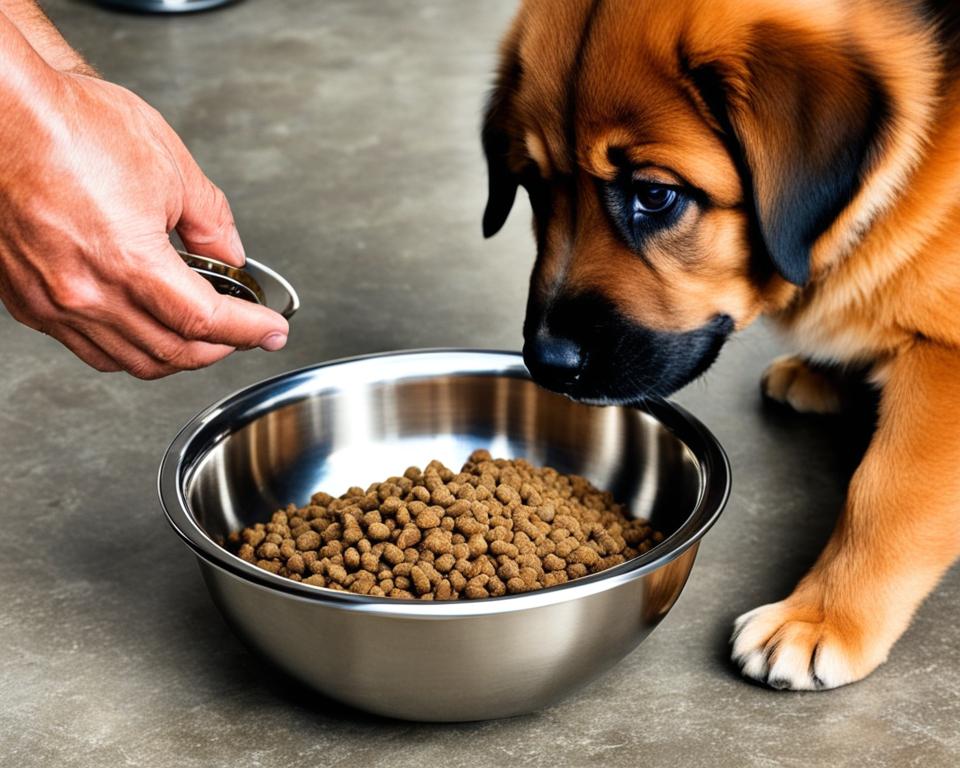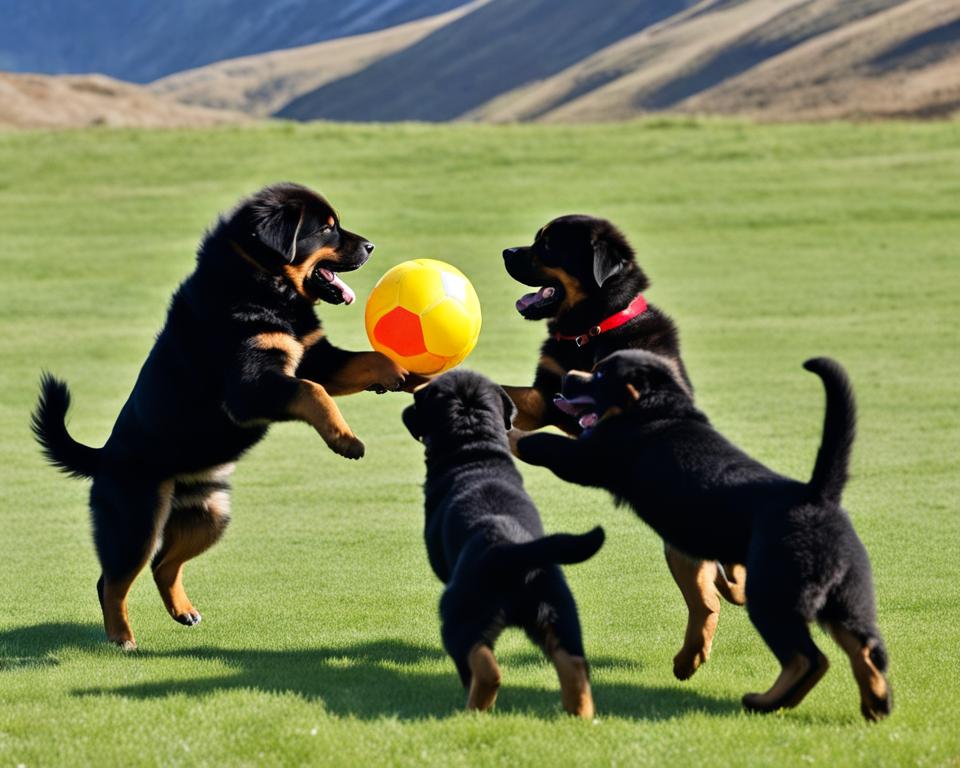Welcome to the ultimate guide to caring for Tibetan Mastiff puppies! Whether you are a new owner or have had experience with this majestic breed before, this comprehensive guide will provide you with the knowledge and tips you need to keep your Tibetan Mastiff puppy happy and healthy.
Caring for a Tibetan Mastiff puppy involves various aspects, including grooming, training, nutrition, exercise, and addressing common health concerns. By understanding and implementing the right practices, you can ensure that your puppy grows into a well-rounded and thriving adult.
Key Takeaways:
- Proper grooming is essential for maintaining the luxurious coat of Tibetan Mastiff puppies.
- Puppy training should start early to establish good behavior and obedience.
- Feeding a balanced diet and following a vaccination schedule are crucial for their health and well-being.
- Tibetan Mastiff puppies require regular exercise and mental stimulation.
- Being aware of common health concerns can help you detect and treat any issues early on.
Socializing and Training Tibetan Mastiff Puppies
Tibetan Mastiff puppies, like any other breed, require proper socialization and training to ensure their well-being and happiness. Socializing a Tibetan Mastiff puppy from an early age is crucial for their development and future behavior. By exposing them to various environments, people, and other dogs, you can help them become confident, friendly, and adaptable companions.
Socializing a Tibetan Mastiff puppy:
- Start early: Begin socializing your Tibetan Mastiff puppy as early as possible, ideally between 3 to 14 weeks of age. This is when puppies are most receptive to new experiences.
- Introduce new experiences: Expose your puppy to different sounds, sights, and sensations. Take them for car rides, walks in the park, and introduce them to new people, children, and other animals.
- Positive reinforcement: Reward your puppy with treats, praise, and affection when they exhibit positive behavior during socialization. This positive reinforcement will help them associate new experiences with something positive.
- Puppy classes: Enroll your Tibetan Mastiff puppy in puppy classes where they can interact with other puppies and learn essential socialization skills under the guidance of a professional trainer.
While socialization is important, puppy training is equally essential to promote good behavior, obedience, and a strong bond between you and your Tibetan Mastiff.
Puppy training for Tibetan Mastiffs:
- Start early: Begin basic training exercises, such as sit, stay, and come, as early as possible. Use positive reinforcement techniques, rewards, and consistency.
- Consistency is key: Establish a routine and be consistent with your commands and expectations. This will help your puppy understand what is expected of them.
- Patience and persistence: Training a Tibetan Mastiff puppy may take time and patience. Remain calm, be persistent, and use positive reinforcement to encourage desired behaviors.
- Professional help: Consider hiring a professional dog trainer experienced in Tibetan Mastiffs if you encounter behavior issues or need assistance with advanced training.
Addressing behavioral issues in Tibetan Mastiff puppies:
If you notice any behavioral issues in your Tibetan Mastiff puppy, such as excessive barking, aggression, or separation anxiety, it’s important to address them promptly. Seek guidance from a professional dog behaviorist who can assess the underlying causes and provide tailored strategies to overcome these issues.
| Behavioral Issue | Causes | Solutions |
|---|---|---|
| Excessive barking | Lack of proper training or socialization, boredom, fear, territorial behavior | Identify triggers, redirect attention, provide mental and physical stimulation, reward calm behavior |
| Aggression | Lack of socialization, fear, resource guarding, protective instincts | Gradual desensitization, positive reinforcement, professional guidance |
| Separation anxiety | Attachment issues, lack of confidence, previous abandonment | Gradual desensitization to being alone, crate training, establish a calm departure routine |
By socializing and training your Tibetan Mastiff puppy effectively, you can set a solid foundation for their future behavior and ensure they grow up to be well-rounded and obedient dogs. Remember to be patient, consistent, and seek professional guidance when needed.
Health and Nutrition for Tibetan Mastiff Puppies
Caring for the health and nutrition needs of your Tibetan Mastiff puppy is crucial for their overall well-being. Providing them with the right diet and ensuring they receive proper vaccinations is key to their growth and development.
Feeding a Tibetan Mastiff Puppy
When it comes to feeding your Tibetan Mastiff puppy, it’s essential to choose high-quality puppy food that meets their nutritional requirements. Look for brands that offer a balanced blend of proteins, carbohydrates, and fats. Consult your veterinarian to determine the right feeding schedule and portion sizes based on your puppy’s age, weight, and activity level. It’s important to avoid overfeeding to prevent obesity, which can lead to health issues later in life.

Vaccination Schedule for Tibetan Mastiff Puppies
Vaccinations play a crucial role in protecting your Tibetan Mastiff puppy from common diseases and ensuring their long-term health. Follow a vaccination schedule recommended by your veterinarian to provide your puppy with the necessary immunizations. The primary vaccinations typically include protection against distemper, parvovirus, adenovirus, and rabies. Regular booster shots are required to maintain their immunity.
Consult your veterinarian for a recommended vaccination timeline, as it may vary based on your puppy’s specific needs and the prevalent diseases in your area. Vaccination not only safeguards your puppy’s health but also helps prevent the spread of diseases to other dogs.
Exercise and Grooming for Tibetan Mastiff Puppies
Tibetan Mastiff puppies thrive when they receive proper exercise and grooming. This section will provide essential information on how to keep your Tibetan Mastiff puppy healthy and well-groomed.
Exercise for Tibetan Mastiff Puppies
Regular exercise is crucial for the overall well-being of Tibetan Mastiff puppies. These energetic and athletic dogs require daily physical activity to maintain good health and prevent boredom-related behavior issues. Engaging your puppy in exercises not only keeps them physically fit but also provides mental stimulation.
- Take your Tibetan Mastiff puppy for daily walks to stimulate their senses and provide them with mental stimulation.
- Provide ample opportunities for playtime, such as playing fetch or participating in interactive games that challenge their intelligence.
- Consider enrolling your puppy in obedience classes or agility training to channel their energy and enhance their training skills.

Grooming Tips
The Tibetan Mastiff’s thick and luxurious coat requires regular grooming to keep it clean and free from matting. Here are some grooming tips for your Tibetan Mastiff puppy:
- Brush your puppy’s coat regularly using a slicker brush or a comb with wide-spaced teeth to remove loose hair and prevent tangles.
- Pay special attention to the ears, as Tibetan Mastiffs are prone to ear infections. Clean their ears regularly using a canine ear cleaner and cotton balls.
- Trim your puppy’s nails regularly to prevent overgrowth and discomfort. Use a dog nail trimmer or seek professional help if needed.
- Brush your puppy’s teeth daily to maintain good oral hygiene and prevent dental problems. Use a dog-specific toothbrush and toothpaste.
House Training a Tibetan Mastiff Puppy
House training is an essential aspect of raising a Tibetan Mastiff puppy. Follow these tips to successfully potty train your puppy:
- Establish a regular feeding schedule to regulate their bathroom habits.
- Take your puppy outside frequently, especially after meals, naps, and playtime.
- Reward your puppy with praise and treats when they eliminate in the designated outdoor spot.
- Use positive reinforcement techniques and avoid punishment to create a positive association with eliminating outdoors.
- Be patient and consistent with your training efforts, as every puppy learns at their own pace.
By providing your Tibetan Mastiff puppy with regular exercise, proper grooming, and effective house training, you will ensure that they grow into healthy, well-behaved adults. Stay consistent and patient throughout the process, and remember to enjoy the journey of raising your furry companion.
Common Health Concerns in Tibetan Mastiff Puppies
Tibetan Mastiffs are magnificent and powerful dogs, but like all puppies, they can be prone to certain health concerns. It’s important for Tibetan Mastiff owners to be aware of these common issues to ensure the well-being and longevity of their beloved pets.
One of the genetic predispositions that Tibetan Mastiff puppies may inherit is hip dysplasia and other bone and joint problems. This condition occurs when the hip joints do not develop properly, leading to pain, lameness, and arthritis. Regular veterinary check-ups and early detection through X-rays can help identify these issues, allowing for appropriate treatment and management.
Eye conditions are another concern in Tibetan Mastiff puppies. Progressive Retinal Atrophy (PRA) is a genetic disorder that causes the degeneration of the retina, leading to vision loss and eventual blindness. Regular eye examinations by a qualified veterinarian can help monitor any changes and provide appropriate care.
Behavioral issues can also arise in Tibetan Mastiff puppies. Due to their natural guardian instincts, they may exhibit territorial aggression, fearfulness, or possessiveness. Early socialization and proper training are crucial in preventing and addressing these behavioral issues. Consulting with a professional dog trainer or behavioral specialist can provide guidance and assistance in managing these challenges.
FAQ
What are some important grooming tips for Tibetan Mastiff puppies?
Tibetan Mastiff puppies have a thick, double coat that requires regular brushing to prevent matting and keep their fur healthy and clean. Additionally, they should be bathed occasionally using a gentle dog shampoo. Nail trimming, ear cleaning, and teeth brushing are also essential parts of their grooming routine.
How can I socialize my Tibetan Mastiff puppy?
Socializing your Tibetan Mastiff puppy is crucial for their development and behavior. Start by exposing them to various environments, people, and other dogs from an early age. Gradually introduce them to new experiences and encourage positive interactions. Puppy socialization classes can also be beneficial for teaching your Tibetan Mastiff how to interact and behave appropriately.
What are some effective training techniques for Tibetan Mastiff puppies?
Tibetan Mastiffs are known for their independent and strong-willed nature, so patient and consistent training methods are important. Positive reinforcement, such as rewards and praise, works best to motivate and encourage them. Training should focus on basic commands like sit, stay, and come, as well as leash training and crate training.
How often should I feed my Tibetan Mastiff puppy?
A proper feeding schedule is crucial for the growth and development of your Tibetan Mastiff puppy. Generally, they should be fed three small meals a day up until about six months old, then transition to two meals a day. The specific amount and type of food will depend on their age, size, and activity level. Consult with your veterinarian for personalized feeding recommendations.
What vaccinations does my Tibetan Mastiff puppy need and when should they be administered?
Vaccinations are essential to protect your Tibetan Mastiff puppy from various diseases. The core vaccines recommended for them include distemper, parvovirus, adenovirus, and rabies. Puppies should receive their first set of vaccinations at around 6-8 weeks old, followed by additional booster shots at specific intervals. Your veterinarian will provide you with a vaccination schedule to ensure your puppy is appropriately protected.
How much exercise does a Tibetan Mastiff puppy need?
While Tibetan Mastiffs are not a highly active breed, they still require regular exercise to maintain their overall health and prevent behavior problems. Daily walks, playtime, and mental stimulation are important for their well-being. However, it’s essential to avoid excessive exercise, especially in puppies, as their joints and bones are still developing. Consult with your veterinarian for appropriate exercise guidelines based on your puppy’s age and physical condition.
What are some common health concerns in Tibetan Mastiff puppies?
Tibetan Mastiffs are generally a healthy breed, but they can be prone to certain genetic health conditions. Common health concerns in Tibetan Mastiff puppies may include hip dysplasia, elbow dysplasia, hypothyroidism, and eye disorders like progressive retinal atrophy (PRA) and entropion. Regular veterinary check-ups, proper nutrition, and early detection are crucial for managing and treating these health issues.

Leave a Reply